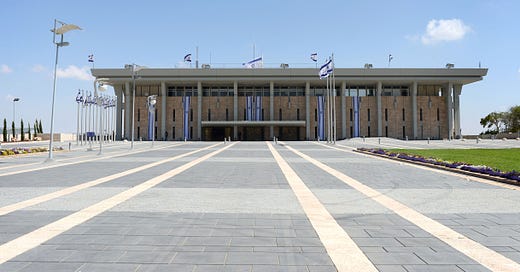Tel Aviv Diary December 16, 2022
Coalition Negotiations, Basic Laws Being Changed, Defense,Housing Crisis and more
POLITICS
Israel’s incoming coalition took its first tentative steps Tuesday, electing Yariv Levin as their new Knesset Speaker. Levin who heads coalition negotiations for Prime Minister-designate Netanyahu is considered one of the PM-elects closest allies. Levin’s appointment is supposedly temporary, as Levin has been expected to serve as the new Justice Minister. However there are some reports in the Israeli media indicate Levin might be interested in remaining Knesset Speaker.
The first act of the new Knesset was to pass the first reading of an amendment to the Basic Law that will permit MK Aryeh Deri to become a minister again. Deri was recently convicted of income tax evasion, but granted a suspended sentence, based on the understanding he would retire from politics. Under the current Basic Law there is no distinction between a suspended sentence and actual jail time. Consequently, Deri would not be have been eligible to become a minister. This was the second time Deri has been convicted of a crime since entering public life. It should be noted that an Israeli Basic Law only requires 61 of the 120 Knesset votes to be changed.
The second law the incoming Knesset passed was a law to change the powers of the Minister of National Security, (in this case, extreme right-wing and former convicted criminal, MK Itamar Ben-Gvir). The change will effectively give Ben Gvir operational control over the police, instead of investing that power in the Chief of Police.
The final bill passed by the Knesset Tuesday establishes a second minister in the Defense Ministry authorized to deal with all civil activities in the West Bank. This new minister is designated to be from the other far-right-wing party, led by MK Bezalel Smotritch, and is expected to pave the way for settlers in the West Bank to achieve their maximalist dreams.
All three new bills have been highly criticized, both by the opposition, as well as most legal scholars. A Committee hearing was held on the planned changes to the powers of the Minister of National Security. At that meeting almost all of the participants were extremely critical. The overriding belief is that changes need to be made, but not through the rushed passage of a bill before a government is actually sworn in. It's not clear what the implications of granting additional powers to the Minister, (i.e., authority given until now to the police commissioner) will be. However, Ben-Gvir’s single-minded insistence that the law to expand his powers be passed before the new government is seated says a great deal about his self-confidence, and the extent to which he trusts Netanyahu to keep his promises.
In the meantime, coalition negotiations continue — and will no doubt last until the very last moment. Negotiations with ultra-Orthodox parties continue to make headlines. Ultra-Orthodox party demands that electricity must not be generated on Shabbat created a public brouhaha. However, such extreme demands, (which are not likely to be met) mask some of the more important concessions that Netanyahu has agreed to give them. The biggest concession— without doubt — is the complete military exemption Netanyahu has signed off on for ultra-Orthodox yeshiva students. It seems like only yesterday that tens of thousands of Israelis came out to the streets in protest against the “uneven burden” (of military service for just some).
The list of what the ultra-Orthodox parties want is long, and includes: a higher percentage of housing starts, additional payments to Yeshiva students, and the end of state support to all conservative, reform Jewish institutions.
Prime Minister-designate Netanyahu continues to give interviews to American media — who do not ask him the hard questions. But more importantly, during the hard follow ups in an interview on Thursday with NPR, Netanyahu claimed Ben-Gvir has changed and will behave more responsibly. Anyone who knows Ben-Gvir knows that assertion is nonsense. The one constant — even from Netanyahu supporters— has been that the veteran PM is doing a terrible job negotiating to create a coalition. But, as one friend said to me last night (that friend, having once served as Director General of the Ministry of Internal Security), called the change in the Basic Laws to give Ben-Gvir more power over the police, a “disaster”. He said the only reason all these concessions were happening is because Netanyahu has a weak hand, as “he is negotiating to stay out of jail. Everybody else is just negotiating for a government.”
In Netanyahu’s continued overseas media tour, he told NPR that that he (Netanyahu) and not Smotritch, will be in charge of West Bank policy (a comment Netanyahu’s office was forced to walk back). Netanyahu also gave an interview to a Saudi newspaper Al Arabia, in which he stated that the key to peace with the Palestinians is peace with Saudi Arabia. The Prime Minister-designate went on to make the amazing comment that he does not share Israel’s planned actions in Iran with the US, since if he does, it will leak to the press and then he will be forced to call off the action.
An interesting development occurred on Thursday, when a letter to Netanyahu began circulating throughout the high-tech community, urging the PM-elect to refrain from making significant changes to the legal system (e.g., the “override clause”). The letter states that part of the reason for Israel’s success in high-tech is the fact it maintains an independent and stable judiciary. Supporters of the new government immediately lashed out, labeling members of the high-tech community who signed the letter “Leftists”. In actuality, the high-tech community, who have to a large degree stayed out of politics, pay for the “largess” of the new planned government.
Netanyahu has one week left to complete his coalition negotiations. I am reasonably confident that he will succeed— but until it’s done, it’s not done. In the meantime, the Likud will try to pass the entire series of laws to accommodate its coalition partners — before the government is sworn in.
DEFENSE
Unrest continued on the West Bank. Israeli troops tragically, unintentionally shot a 12-year-old girl on Monday night during a gunfight in Jenin. The army admitted the mistake. Defense Minister Gantz apologized.
Israel reportedly attacked Syrian positions near the border early this week; while Chief of Staff Kochavi stated Israel had indeed attacked a convoy of trucks crossing the Syrian Iraqi border area last month. Kochavi went as far to say that one truck in particular contained arms and it was destroyed by Israeli aircraft. His admission was criticized by some in the defense establishment, stating that Israel should neither admit to or deny any actions in Syria.
The prevalent myth circulating, that children of the rich all go into technology-related jobs in the army, while poor kids from Israel’s periphery become combat soldiers was disproven on Thursday, when the army Manpower Division released information on the most recent drafts. According to the IDF Commander of the Manpower Division General Yaniv: While those in higher socio-economic classifications in Israel make up 40% of the population, they make up 55% of the soldiers in the Army. Furthermore, 80% of the soldiers who are physically and mentally capable of combat serve as combat soldiers, with those from higher socio-economic strata being more likely to serve in combat units than those not. Also noted was that 87% of the graduates from secular high schools go to the army; 83% of the graduates from Religious Zionist high schools and 9% of the graduates from ultra-Orthodox schools.
ECONOMY
The Israeli economy registered a .1% increase in prices during the month of November. Nevertheless, the headline carried by all the news media highlighted the fact the price of apartments rose by over 20% this past year. There are signs, however, that the market is cooling, with new apartment sales down by 60% in November year-over-year. The drop in home purchases is a result of rising interest rates, as Bank of Israel has increased the Prime rate. The problem is that as a result of the drop in sales contractors have chosen to halt new projects. While higher interest rates dampen sales, and of course raise the cost of buying an apartment, the underlying problem is a lack enough housing. Consequently, the rise in interest rates, accompanied by the drop in sales could end up exasperating the housing problem.
BUSINESS
The startup, Nilus, exited Stealth mode and reported a $8.6 million investment. Nilus developed a platform for Cash and Accounts Receivable management that automates the process. Leading the investment round was Bessemer Venture Partners, with Better Tomorrow Ventures and Symbol participation.
Equinom, which produces seeds for the food industry, has raised $35 million led by Synthesis Capital.
A PIECE OF HISTORY
Allenby Conquers Jerusalem
The British began their campaign by capturing Sinai from the Ottomans, in a series of three battles. The next step was to conquer Gaza. British forces attacked Gaza first on March 26th 1917, then again on March 26th, and were repulsed both times. The British Generals commanding the forces were relieved and a stalemate ensued. The British broke through when they captured Be’ersheva, following the Battle of Be’ersheva on October 31st. British expeditionary troops then went on to capture Jaffa, after defeating Ottoman troops on November 14th. The British and the Ottomans clashed in a number battles that became known as the Battle of Nebi Samwill. The British eventually defeated the Ottomans in those battles.
On December 9th 1917, British forces occupied Jerusalem. General Allenby, who commanded the British forces was instructed to enter Jerusalem on foot, as an act of respect. When Allenby arrived, he stated “We have come not as conquerers, but as deliverers. It is our intent
ion to open a new era of brotherhood and peace in the Holy Land.” To the Jews, Allenby’s arrival was celebrated as a great moment. There was hope that a new era had dawned for the Jews of Palestine.
A TASTE OF TEL AVIV – M25
RESTAURANT REVIEW, by Tali Schulman
Walk down the meat isle of Shuk HaCarmel, and at the bottom you will find yourself right in-front of M25 — one of my favorite places to keep coming back to. Best known for their meat counter, where you pick your choice of meat, the truth is that’s not what keeps me coming back. All of their side dishes are the true stars! Written on the wall you will find them — green salad, butcher cut salad, arias, shawarma plate, they’re all fantastic. One of my favorite ways to spend a Friday afternoon is in M25’s back garden with a butchers’ cut salad (“salat katzavim”), which is a primarily herb-based salad, with perfectly cut slices of steak in an absolutely delicious fish sauce dressing, accompanied by Arais, served with the most delicious tahina, tomato, garlic pile. Following the food, make sure not to miss out on their chocolate mouse, it’s truly the perfect way to finish a meal.
For more Tel Aviv restaurant recommendations, you can find me on Instagram @talischulman where I save all my food adventures in my highlights!








